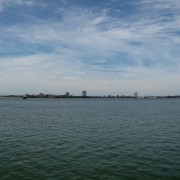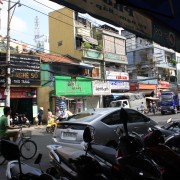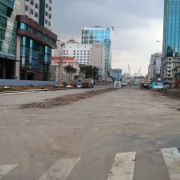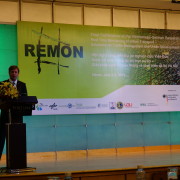Current Perspectives of Vietnam
History is a series of perspectives on events; the victor usually writes the final version but there is no denying that there are Chinese, French, American, and Soviet perspectives when exploring Vietnam’s past. Examining present day Vietnam is seen through the eyes of individuals—those who have come here for the first time, locals, or those who have adopted this crossroads of development and tradition as their home. No matter which category you fall into, Vietnam will definitely be a wild and crazy ride at first, filled with extreme high points and it will also leave you frustrated and bewildered at other times.
On this blog, we mostly explore cross-cultural issues, business, and recent news and events all in an attempt to better understand Vietnam, its culture, and its people. However, the Vietnam experience is not uniform–that is to say that it is different for everyone who lives, works, or travels in Vietnam. For example, imagine a 20-something year old single British male English teacher’s experience in Saigon compared to the Hanoian experience of a 30-something year old Indian wife and mother of two. Or perhaps that of a 50-year old single American businessman working for a multi-national corporation (MNC). Or a young French woman, in a long-distance relationship, who is working for a non-governmental organization (NGO) in a remote town located in central Vietnam. You get the point (and, by the way, these were all fictional but plausible examples).
Perhaps the most interesting perspective is that of the Viet Kieu (or “Vietnamese Sojourner“). Thousands of people fled Vietnam during the Second Indochina War and thousands more fled after Vietnam was reunified in 1975, resulting in millions of people creating the Vietnamese diaspora throughout primarily North America and Europe. Many Viet Kieu families left Vietnam with just the clothes on their backs and settled into a new country to call home, usually starting over again with almost nothing. Subsequently, the Vietnamese government took a hardline position on those who had fled the country and denounced them as traitors. After some years, the Vietnamese government eventually called for the Viet Kieu to come back to Vietnam to reintegrate and afforded them special property and business rights in order to help speed up Vietnam’s economic development.
The younger Viet Kieu bring an interesting perspective to Vietnam—they usually grew up in culturally Vietnamese households but were exposed to western cultures and societies–undoubtedly mashing up the best elements from east and west. A Viet Kieu’s ability to have one foot in the west and another here in the east allows him/her to integrate more easily here and to bridge the cultural gap that non-Vietnamese sometimes find difficult to overcome. However, some Viet Kieu may, over time or immediately, reveal an arrogance that local Vietnamese can sense, perhaps due to socio-economic disparities. Actually, the best combination for people who seem to understand high global standards and the local way of doing things are Vietnamese who have successfully studied abroad and have been exposed to a different lifestyle. They are able to reflect, learn, and grow in ways that only travel and living abroad allow.
Only by opening up to differing perspectives can we begin to understand the world around us and how we fit in it. So, the following is a non-exhaustive list of blogs and videos relating to life in Vietnam (from mostly an outsider’s perspective). Of course, there are also Vietnamese bloggers and video bloggers (Vbloggers). We can’t share links to them here for legal and liability reasons (and if you don’t speak Vietnamese then they may serve little use to you, especially if using Google Translate).
It’s important to note that GKTA Group Limited neither endorses nor condones the varied views expressed in the blogs below—unless expressly stated otherwise. They are listed to demonstrate that no two people will have the same Vietnam experience although there will be many similarities and overlapping challenges.
Who? An American English teacher expat in Saigon
What? A pretty raw look at living in Saigon as an English teacher and interesting experiences encountered while meeting other cultures.
Why? Because English teachers seemingly make up 80% of the expats here in Vietnam.
You should check out this post.
Who? A British expat who has made Saigon her home with her multi-cultural family.
What? Ms. Ray mostly “ blogs about the ups and downs of writing and living in Vietnam.”
Why? Insight from someone whose first time in Vietnam was in 1996 and has a deep reservoir of global experiences.
You should check out this post.
Who? A traveling, backpacking, really rad couple going by the brand, “Because We Camp.”
What? A landing in Hanoi and subsequent travel down south to Saigon via motorbike.
Why? Included because it provides an accurate portrayal of a common first impression of Vietnam and it was enjoyable to watch.
You should check out this episode.
Who? A former American university president.
What? A transitional blog, where the writer shares his thoughts and juxtaposes historical themes with cultural elements.
Why? Experience in the American education system and now heads up a university in Vietnam.
You should check out this post.
Who? From current Prime Minster Nguyen Tan Dung.
What? A summary of the economic state of Vietnam and some projections for the near future.
Why? Self-explanatory.
Who? From an American political writer.
What? A first-time account in Hanoi and Vietnam largely through a political lens.
Why? Entertaining first impressions of being in Hanoi–looking forward to Part 2 in Saigon.
Who? NY Times writer Nicholas Kristoff.
What? An extraordinary look at one Vietnamese girl who defied all odds to become Graduate of the Year.
Why? Recent American college graduates, here’s one face of your competition who is willing to work harder for less money than you are.
Who? A nomadic photographer.
What? One woman’s view as an expat in Saigon.
Why? A blog about living in the moment—something that can be hard when adjusting to new settings, new faces, and new conditions.
You should check out this post.
Who? A younger American Viet Kieu.
What? Straight from California and living in Saigon for at least three years, Kyle Le (or ethnic version: Ky Le Le) showcases various interesting experiences from finding a good burger to asking foreigners what their impressions are of Vietnam.
Why? He has some interesting interviews with celebrities and foreigners.
You should check out this clip.
Who? An American/Canadian team ventures off in Vietnam in association with National Geographic.
What? A look at a Viet Kieu’s first time in Vietnam, traveling throughout the land, and the importance of family.
Why? Come on, it’s National Geographic.
And finally, from the perspective of a drone.
The point of this post was to communicate that everyone has something to add to the tapestry of the Vietnam experience but also that those experiences should be scrutinized (even ours) until the reader has had the chance to check out Vietnam for him/herself. There is no substitute for direct experience but short of that, the account, analysis, or opinion that you entertain should be sound, relevant, and contextual.
In the end, Vietnam is what you make of it—through the good times or the bad times or whatever experience in between. It’s not always easy to live here but after some time you will come to enjoy it and perhaps even thrive in the environment here. If not, then the alternatives always available are to go back to wherever you came from or to move on, which, in that case, there is no shame since Vietnam is not for everyone.
But while you are here, the only thing that you can directly control (and throughout life) is your attitude: toward others and toward the situation that you are in. We hope that these other current perspectives of Vietnam have allowed you to gauge how your experiences and perceptions are in line with other people. Should you wish to, please share your own experience in Vietnam below.









